Westminster, California. July 22, 2015.
A squad of 23 police officers serve a search warrant at a house in Little Saigon, twenty minutes from Disneyland. Inside, suspects run from the commotion, trying to tear an air conditioner out and escape through a window. A dozen huddle in the living room in a pile, trying to hide their faces. All seventeen people are detained, and three arrested.
Videos by VICE
Police discover a makeshift pawnshop in the garage. They find evidence that the owners sold guns there, and doled out pot and cocaine to keep their clientele hooked. But the real moneymaker sits in a back room painted with neon fish. It’s the arcade game Dragon Hunter, a machine that’s part of the increasingly popular—and controversial—”Fish Hunter” genre. Less than a month later, Westminster SWAT raids a similar gambling den twenty minutes away, this one with ties to organized crime. Again they find weapons, drugs, and what gamblers refer to as “the fish game.”
It’s becoming a familiar story.
Honolulu, Hawaii. July 31 st , 2014.
The Honolulu Police Department raids an arcade after local residents complain that the business—already shut down by police—has secretly reopened to gamblers. Patrons enter through a locked back door speakeasy-style, with only trusted customers gaining admittance. Honolulu Police confiscate Ocean King and Fish Hunter cabinets in the operation, games nearly identical to Dragon Hunter. Prosecutor Keith Kaneshiro hails the operation as the latest blow in his ongoing crackdown on a chain of gambling arcades, and hands down 414 felony indictments on nine individuals—initiating the largest anti-gambling case in state history.
Hong Kong. January 15 th , 2016.
Hong Kong Police strike an arcade in Kowloon as part of a citywide anti-Triad operation codenamed “Levington.” They arrest forty people and confiscate nearly $2,000 in cash—along with six games, including fishing games.
Siem Reap, Cambodia. March 21 st , 2016.
Military Police storm an illegal casino housed in five apartments near Angkor Wat. Cambodian authorities arrest 14 people and seize three Fish Hunter machines.
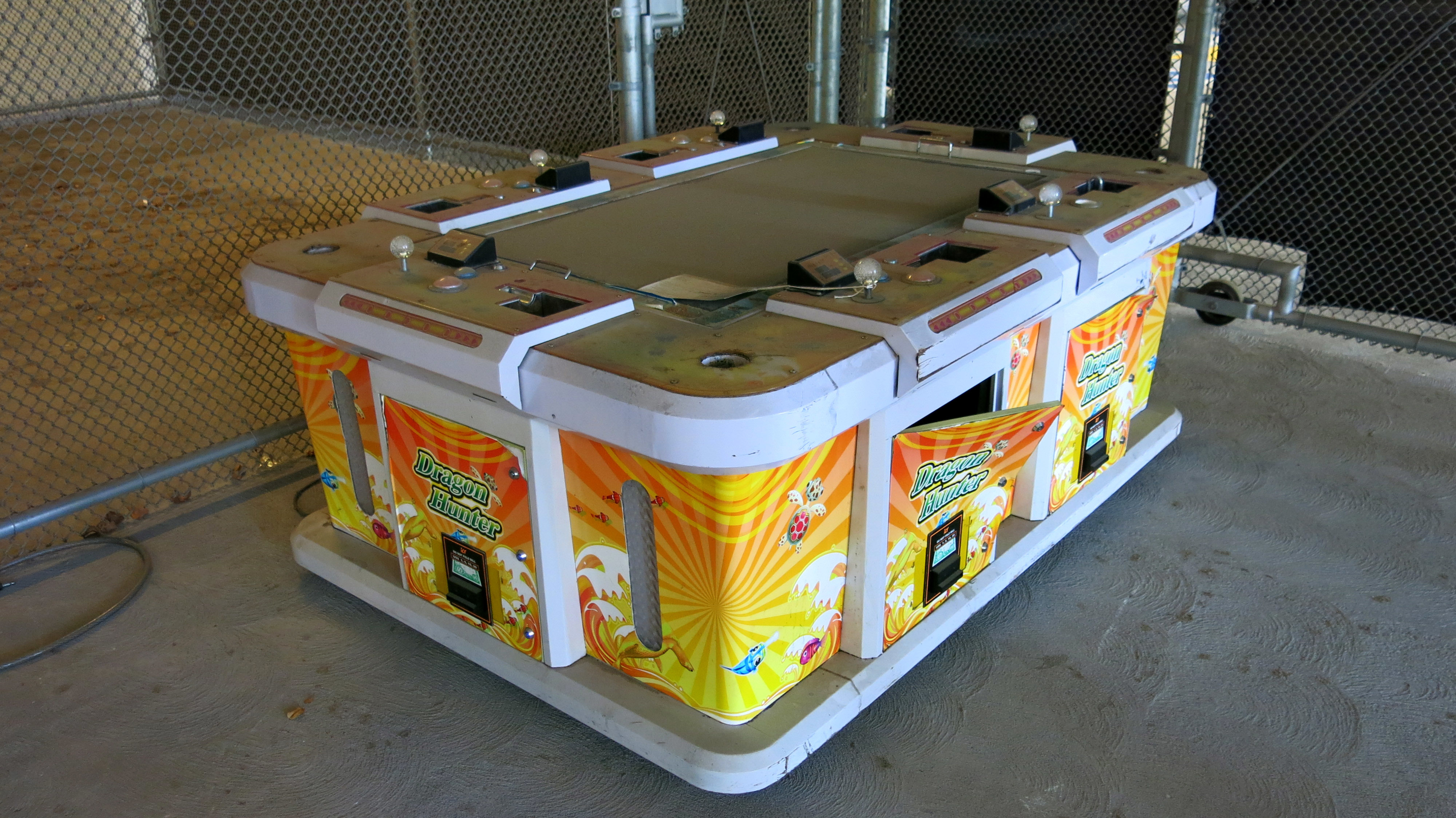
A six-seater version of Dragon Hunter seized by the Westminster Police. AP Photo/Amy Taxin)
Wildly popular in Asia, but virtually unknown in the US, Fish Hunter games are developing a reputation as the arcade cabinet of choice for underground gambling. Riding the line between casino machine and arcade entertainment, games like Dragon Hunter are testing the legal limits of what’s allowed in the arcade space—and quietly becoming the most controversial game you’ve never heard of.
Fishing games go by many names— Fish Hunter, King of Treasures, Dragon Hunter, Ocean King—but they all share the same basic mechanics and objective: feed in money, kill the fish, win big.
The game appeared in China about a decade ago, and immediately blew up due to its simple mechanics and addictive play. Walk into any arcade in Hong Kong and you’ll see them ranked up in clusters with players sitting around the edge, slapping their cigarette-burned control panels. Unusually for a video game, the machine is especially popular with seniors.
Colorful fish school across the a glass screen inset into a table—like a the cocktail arcade machines of the 80s and 90s. Six or eight control stations are situated around the edge of the screen, and each station has a joystick that controls a traversing gun turret, as well as “Shoot” and “Change Weapon” buttons. Even though this is a “fishing” game, it more closely resembles a large, multiplayer turret-shooting arena
To play, you feed money into the cash slot to buy credits, which also double as ammunition—$1 might buy you 100 credits, for example, with your gun using up 10 credits with every shot. However, you can also tap the “Weapon” button to enhance a shot, making it more powerful, and—theoretically at least—able to catch bigger fish or score more points. While a standard shot might cost 10 credits, it’s not unusual for a maximum shot value to be 500 credits, or $5 per button press.
If that seems expensive, note that many of these machines accept $100 bills.
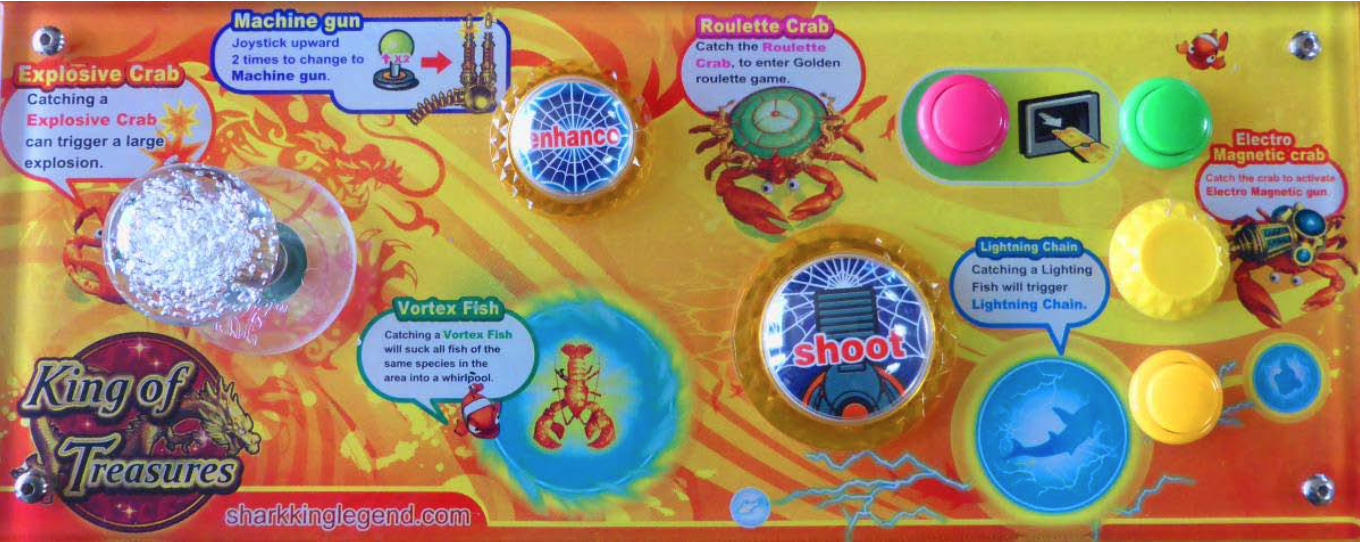
The controls for King of Treasures. Photo courtesy of Gaming Laboratories International
The fish have point values, though the largest ones—orcas and whales—can soak heavy amounts of damage or travel with a host of lower-point bodyguards. There are also random jackpot events, like crabs that trigger minigames, or creatures that explode or grant bonuses. Every time you catch a fish, its point value gets added to your credit pool—meaning you can build up more credits than you started with. And that’s where these games run afoul of gambling laws.
Depending on the machine’s redemption process, players that press the “Cash Out” button either get prize tickets, a printed receipt showing their credit, points on an e-credit card, or simply a shower of coins. The coin prizes obviously recall the old image of casino slot machines—but underground gambling dens tend to prefer the lower-profile receipts and arcade cards.
The illegal “slaphouses” in California—a police slang term, stemming from the noise of fingers hitting buttons—and arcades in Honolulu allegedly worked on the receipt model. Gamblers would belly up to the prize booth and turn their credits back into cash. The Hong Kong arcade functioned similarly, but the house also took a 10% cut during cash out. In all these cases it was the exchange for money—not the game itself—that made the operation illegal.
But even then, police moved on these businesses not only due to the gambling, but the crowd that coalesced around these underground venues. Honolulu police shut down one secret Kalihi arcade only after neighbors complained that it was attracting “undesirable elements” that would fill the parking lot at 4:30 AM. Westminster, California police moved on the house in Little Saigon after watching a man exit the building and draw a three-foot machete out of his pants. There have been fights at the California slaphouses too—earlier this year, an escaped convict shot a man outside an a underground den in Santa Ana. In both Hong Kong and California, the arcade management had ties to organized crime.
However, while these incidents remain very real, it’s important to remember that gambling isn’t an inherently criminal activity says Doctor Timothy Fong, co-Director of the Gambling Studies Program at UCLA. Doctor Fong points out that many people participate in legal gambling without issue, but illegal gambling dens still carry a stigma—partially because they tend to serve economically disadvantaged people.
“For years gambling was associated with the lower class, organized crime, people who were trying to skirt the system,” he told Waypoint in an interview, adding that legal gambling venues have mostly removed that tarnish. However, underground gambling dens attract a different clientele than legal casinos or online venues—people who have a hard time getting to legal casinos, don’t have internet access, or have made gambling part of their daily routine, and that affects how people perceive them. “Imagine if you were that hungry for gambling, that you would go get some action an a video game that’s been altered. Most gamblers don’t think that way, but someone running with the circle we’re talking about might be interested in doing something like that.”
Doctor Fong also offers insight into why Fish Hunter has spread around the Pacific Rim—finding fertile soil in heavily Asian-influenced communities like Honolulu and the Vietnamese immigrant areas of Westminster, California. “Gambling is a part of life for many Asian cultures from the time people are born, to the time they die,” he says.
“The most important thing is customer protection, to ensure players are playing something that’s fair, that the odds are going to be known to them, and the rates of outcome will be consistent—and that’s the problem with gambling dens.” -Dr. Timothy Fong
According to Doctor Fong, gambling isn’t entertainment in Asian culture, but a way to glimpse a person’s fate—similar to randomized divination rituals like kau cim fortune-telling sticks. Winning money means a boost in self-worth and being judged as having upright moral character, while losing it could mean the opposite. “If I literally read the tea leaves, or play this game of chance, it might get me a snippet of what the ancestors have planned for me,” he says. As a result of this cultural dimension, many Asian communities don’t perceive gambling as wrong, even if it’s illegal.
Given these cultural roots, it’s not surprising that a wagering game that’s swept Asia has also gained purchase in Asian-American sections of the US. While these are culturally and ethnically different groups, says Dr. Fong—and he cautions that not all Asians gamble—the theme of wanting to play and “go big” when betting retains some similarity.
When asked about whether these gambling dens are dangerous, Doctor Fong points out that they primarily pose a danger to the gambler—not just physically, but financially.
“The most important thing is customer protection, to ensure players are playing something that’s fair, that the odds are going to be known to them, and the rates of outcome will be consistent—and that’s the problem with gambling dens. You have no idea how it’s actually being controlled or regulated.”
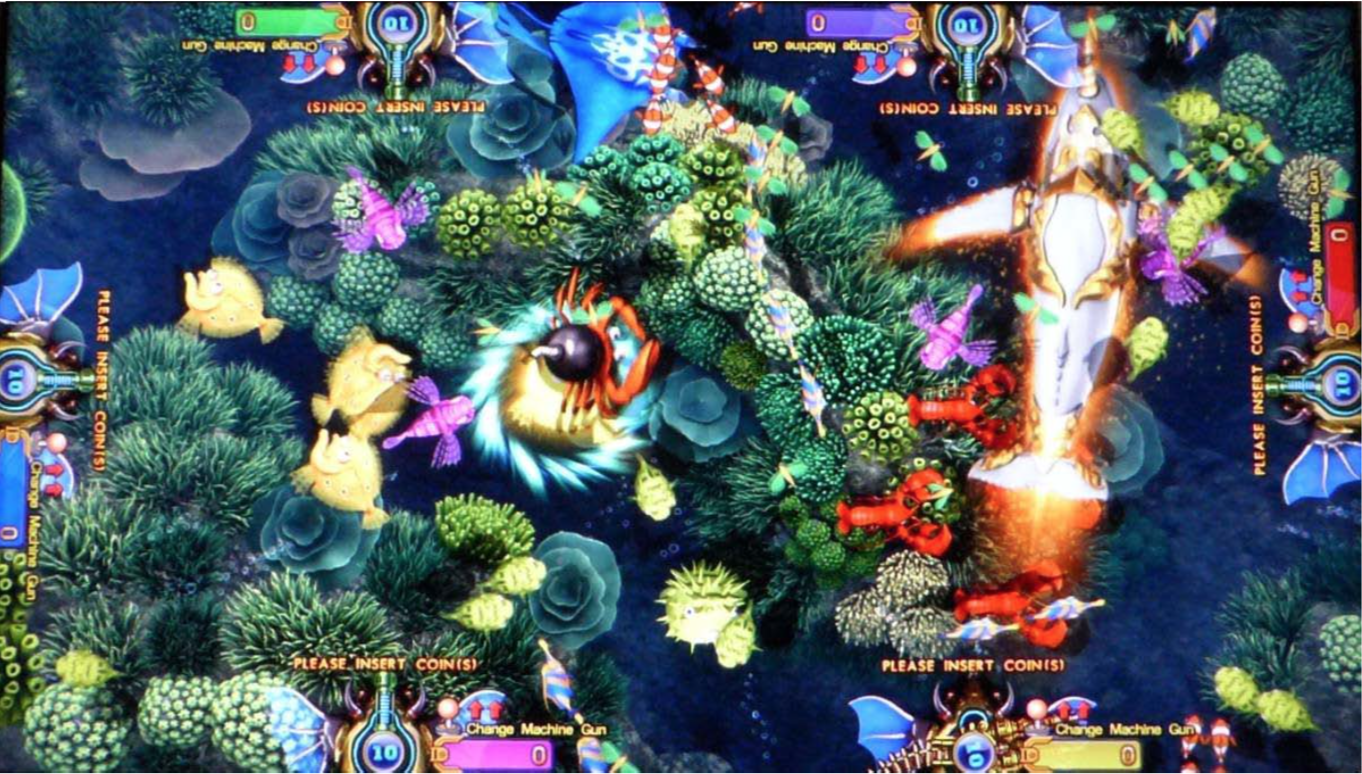
King of Treasures in action. Screenshot courtesy of Gaming Laboratories International
According to Doctor Fong, casino machines are inspected to ensure they pay out at a certain rate, but arcade games are not. Non-cash redemption machines, like Skee Ball, exist in a strange grey area of gambling law.
Often, the question of whether to regulate a game comes down to whether it’s chance-based, or skill-based. Consider pinball. When the machines emerged in the 1920s and ’30s, municipal governments tried to crack down on them as gambling devices—which they often were—while owners claimed pinball was actually a game of skill. (This defense only gained traction after 1947, when the industry began adding flippers.)
The most famous skirmish of the pinball controversy occurred in 1942, when New York Mayor Fiorello LaGuardia banned pinball machines, seizing thousands of them in Prohibition-style raids. After smashing a few with a sledgehammer for the benefit of news cameras, LaGuardia ordered the rest stripped for wartime scrap metal. Pinball would remain banned in New York City until 1976.
This same argument played out during the Honolulu arcade crackdown of 2014. When prosecutor Keith Kaneshiro issued a notice declaring Fish Hunter games and sweepstakes machines to be gambling devices, arcade owners countered that they were games of skill rather than chance. Games of skill, after all, are common in the arcade industry and legal even if the vast majority of players don’t receive a prize. Skee Ball, carnival games, and crane machines fall under this definition, for example, since the player can theoretically improve their chances by mastering the game. And if the prizes are for tickets that have no monetary value, no one’s getting hurt.
“It’s a bit of a loophole,” says Doctor Fong. “It’s never risen to the level of public concern, that people are dying or losing their shirt because of a Skee Ball machine. The thought has always been: ‘Well, everyone knows they’re kind of quasi-rigged, and they’re only losing a few bucks.’”
That’s how versions of Fish Hunter, mostly branded as Harpoon Lagoon, can exist at Chuck E. Cheese without anyone batting an eye. Law enforcement doesn’t care about ticket machines.
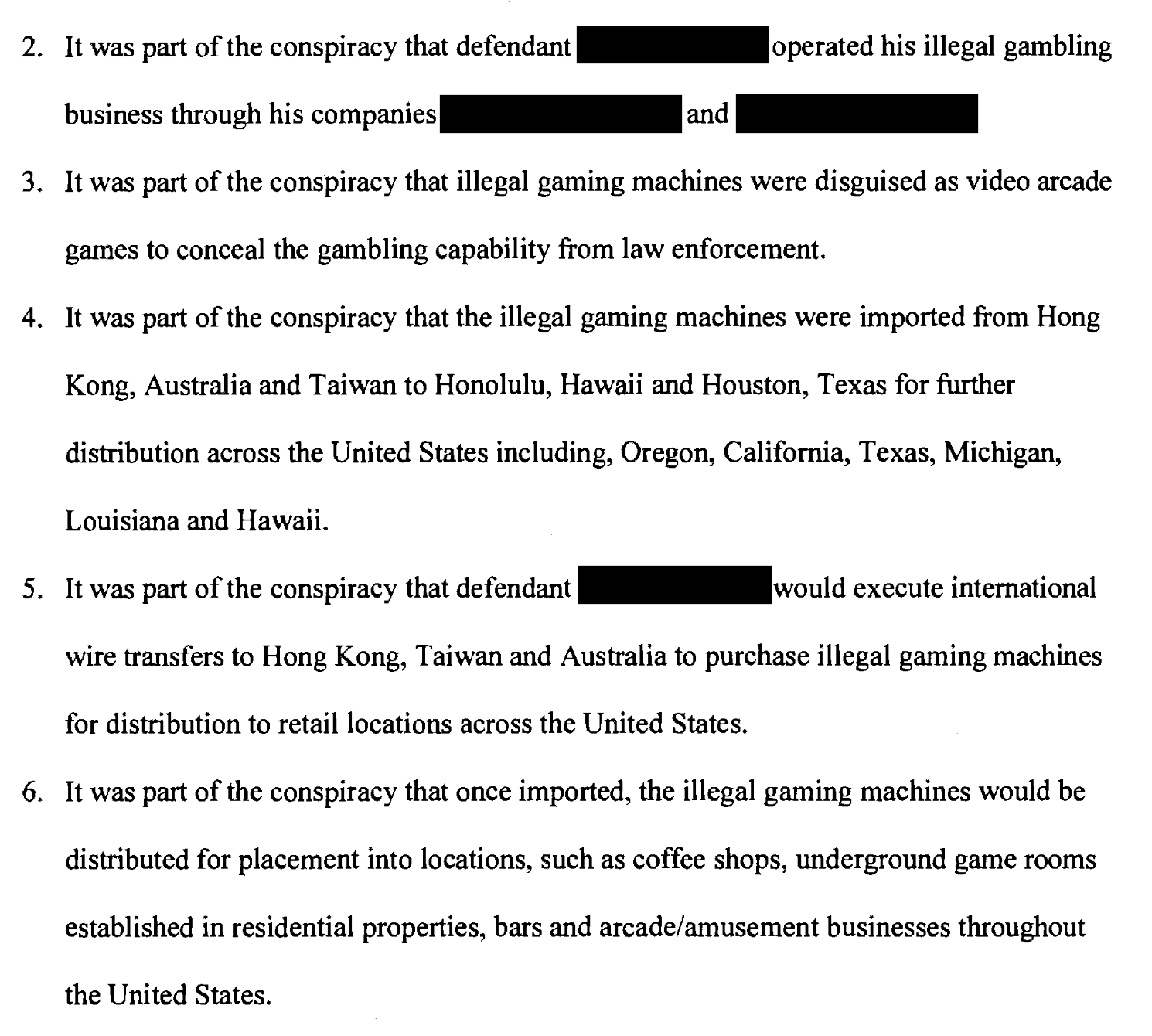
An excerpt from the indictment in the Lava Cafe case.
But even after one of the raided Honolulu arcades phased out cash prizes and spent thousands of dollars making its Fish Hunter machines compliant, police once again entered the property and seized machines—because Honolulu prosecutors now consider Fish Hunter games to be a de facto gambling device, no matter how they distribute prizes.
When reached for comment, the Department of the Honolulu Prosecutor declined to outline how it made this determination. However, it provided Waypoint with a forensic report on the game King of Treasures, originally commissioned by Homeland Security Investigations, a department of ICE that focuses on cross-border criminal activity.
When contacted, ICE representatives refused to comment on the report, citing an ongoing case. However, representatives confirmed that ICE commissioned the forensic examination after seizing a King of Treasures machine from the Lava Café in Portland, Oregon. Though the Lava Café appeared to be a standard Vietnamese-owned eatery from the outside—albeit one where the servers wore lingerie—a federal investigation revealed it to be the center of an illegal sports betting and marijuana distribution network. A federal indictment Waypoint obtained through a court records search accuses the shop owners of importing gambling machines “disguised as arcade games” from Hong Kong, Taiwan, and Australia. ICE commissioned the report, it seems, to get an expert judgment on whether Fish Hunter games belong in the arcade or the casino.
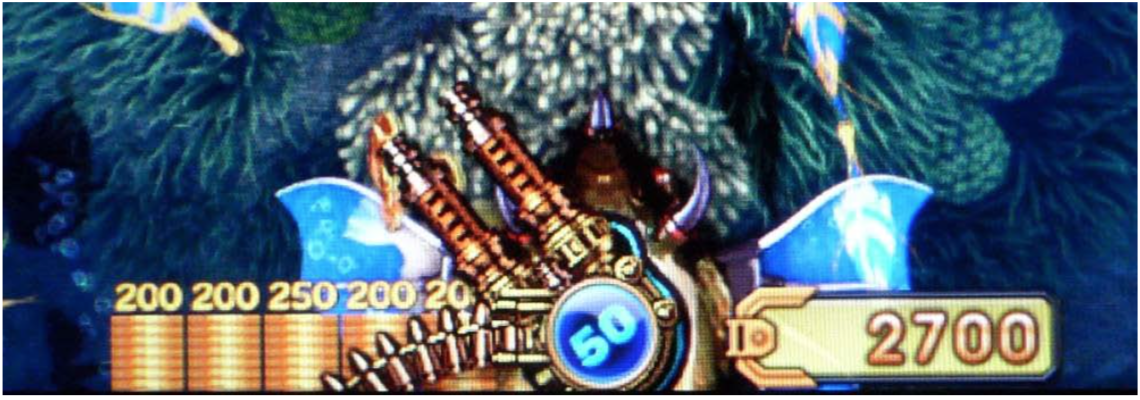
The aiming mechanism in King of Treasures. Screenshot courtesy of Gaming Laboratories International
The 2015 report, compiled by gambling consultants Gaming Laboratories International (GLI), is an analysis of both the gameplay and architecture of King of Treasures. In their examination, the analysts played the machine using different strategies, ultimately discovering that the player’s rate of success changed little based on technique. In fact, when they left the station unattended with the Fire button permanently engaged, they recorded a rate of return (the average amount of a wager the player wins back) of around 94%—in line with the machine’s lifetime average return of 93-97%.
As a result of these tests, GLI concluded that “while certain players … may experience a winning or losing series of game plays, the ultimate determining factor in the overall payout of the device resides within the software itself.”
In other words, even though Fish Hunter games appear to be skill-based, they’re actually games of chance where a software governor controls the payouts with a set algorithm. If players are losing too fast, the game will spawn easier-to-kill large fish or trigger a jackpot. If the player’s doing well, it ramps up the damage necessary to down a high-point fish. As far as the analysts could tell, this chance system makes wagering more on each shot worthless, since the game is ultimately determining randomly whether or not the player actually catches the fish they hit. GLI also pointed out that operators can adjust this algorithm via the game settings menu, where operators can set the game’s “Chance Level” anywhere between 1 and 10.
That’s a feature more common to slot machines than arcade games.
“The King of Treasures device, as provided, possesses all of the characteristics typically associated with a gambling device,” concluded the report. However, GLI also noted that this definition would only hold water if the game’s credits or tickets were exchanged for cash or a cash-equivalent on site.
As casinos turn to video game-slot machine hybrids as a way to draw in Millennials, the line between an arcade and a casino will get increasingly thin.
But as definitive as this report seems, forensic reports don’t always hold up to legal scrutiny. Despite the large number of machines confiscated, Honolulu prosecutors couldn’t get those 414 felony gambling charges to stick in court. First, a judge threw the case out in 2014, after it came to light that the prosecution’s gambling expert wasn’t certified to comment on sweepstakes machines. The state re-filed, but last August the prosecution’s second attempt got dismissed with prejudice under a speedy trial rule—and because their case still contained the tainted expert testimony. Despite the state dropping all charges, eighty of the arcade owners’ machines remain in police custody.
Far from being an outlier, these arcade raids are a sign of things to come. As casinos turn to video game-slot machine hybrids as a way to draw in Millennials, the line between an arcade and a casino will get increasingly thin.
“The last gambling conference I went to in Vegas, the new trend was video game machines where you have much more interaction, like Guitar Hero, or Dance Dance Revolution,” says Dr. Fong. “You’re controlling a video game character, and if you get a certain number of achievements you win a bonus.”
“There’s going to be a lot of debate in the next two to five years, because these machines don’t look like traditional slot machines.” -Doctor Timothy Fong
But for law enforcement and legislators, these machines will mean writing and enforcing new laws that stamp out underground gambling, yet preserve arcades and carnivals. That will prove tricky, and mistakes have already occurred. One Florida law proved so broad that Disney World removed its ticket redemption games and claw machines in case they fell afoul of the police, and arcades like Dave and Busters argued that the law disallowed legitimate arcade systems like added-value swipe cards. This quandary will only get deeper as popular arcade games like DDR come to market in both gambling and non-gambling versions—or if unethical arcade owners create a version that can switch from one to the other.
“There’s going to be a lot of debate in the next two to five years, because these machines don’t look like traditional slot machines,” says Doctor Fong. “They have that integrated [gameplay] experience, and people aren’t quite sure what to call it. But at the end of the day, if you put [a machine] in your place of business—and [customers] pay you money based on an uncertain outcome—then it’s gambling.”
If history is any indication, underground gambling will never go away—but it may go digital.
Gambling is entertainment for the vast majority of people, but 2-3% of gamblers fall into the world of gambling addiction or gambling disease. If you suspect that you or someone you know has a gambling problem, visit the UCLA Gambling Program website for information about treatment. If you live in California and are seeking help for gambling addiction, call 1-800-GAMBLER to get assistance.
Robert Rath is a freelance writer, novelist, and researcher based in Hong Kong. His articles have appeared in Waypoint, Vice, Playboy and Slate. You can follow his exploits at RobWritesPulp.com or on Twitter at @RobWritesPulp




